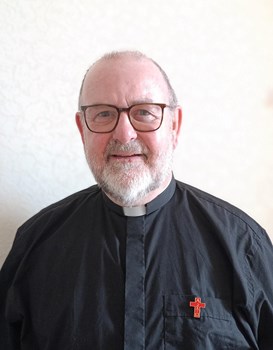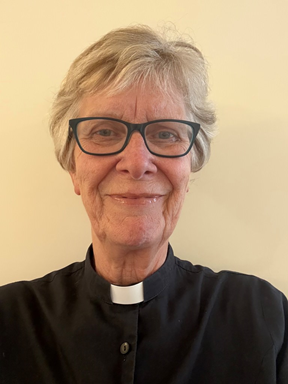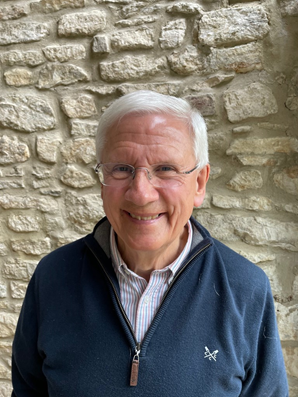A REPORT published last October showed retired clergy to be the largest group among ordained ministers in the Church of England. They outnumber licensed clergy in every diocese — in some, by a factor of more than two.
Taken together, the number of clergy pensioners and their spouses, plus retired self-supporting ministers, approaches 25,000, suggests Canon Julian Hubbard, a former Director of Ministry at the Archbishops’ Council, and, since 2020, Retired Clergy Officer (RCO) for Guildford.
He is the author of the report The Role and Work of Retired Clergy Officers in the Dioceses of the Church of England. Forty-one out of the 42 dioceses responded to the survey of what that ministry comprised, which revealed a wide variation, depending on size, geography, and culture.
There was variation even in the title given to the post, or the understanding of it. Some were “officers”, indicating someone with a position of authority in the organisation; others “advisers”, denoting someone with knowledge to be consulted; and others “chaplains”, emphasising spiritual and pastoral responsibilities.
A ministry that evolved out of the episcopal pastoral oversight of retired clergy had latterly been drawn towards organisational concerns such as questions over safeguarding, permission to officiate, deployment, fitness to practise, and strategic aims, the report suggests.
Almost all are unpaid. In 28 dioceses, the RCO is not a member of any diocesan work group, department, or structure. In 38 cases, they have no annual budget for retired clergy work. Eighteen out of 37 responses to questions about job descriptions revealed that eight had none, while others were out of date, not agreed, or had been written informally by the post-holders themselves.
The report found that, in most cases, the role and work of RCOs was not grounded in diocesan strategy, or indeed any stated wider aim. “The general position of RCOs in most dioceses appears to be outside its structures and networks and tangential to its counsels,” the report concludes. It found a wide variation in working terms and conditions.
The report further floats the question: “What contribution might the Church need and hope for from retired clergy in the present context, and what needs for care and welfare might retired clergy and their partners present over the next?”
The latest ministry statistics show 7210 clergy with PTO. Anecdotal evidence suggests that one quarter of all services are being taken by retired clergy, who, in addition, provide an unspecified quantity of other types of ministry. That leads the report to conclude: “It seems obvious from the data that retired clergy have a vital part to play, given the current gap in resources now and for the foreseeable future.
“And at a time of chronic straitened ministry resources, the gifts and experience of retired clergy in all forms of ministry, including taking services, should be at a premium. It cannot be assumed that retired clergy will inevitably step up to help. The ministry data show that in the year after retirement, only 34 per cent of clergy take up PTO. Their average age is 74.9 years, and the cohort of retired clergy and their partners in any diocese includes some of advanced age.
“Retired clergy seem to have a high life expectancy, with significant numbers in the ‘fourth age’ in most dioceses. It is a group likely to present the full range of issues related to the stages of ageing.”
Canon Hubbard reflects that, 30 years ago, the role (or its equivalent) was largely to keep in touch with retired clergy and update the bishop if someone had died, or whose circumstances needed to be known.
His own job description in Guildford is a blend of the pastoral, in keeping in touch (including gatherings either in-person or on Zoom), and the administrative, particularly in relation to permission to officiate (PTO), safeguarding, and accreditation.
“Some dioceses are more obviously reliant on retired clergy, especially in rural areas, where, I think, they’re having to create more of a policy around retired clergy because of the need,” he suggests. Bishops’ interest varies, too, leading him to reflect: “There isn’t a single bishop that wouldn’t have a pastoral heart and gratitude toward [the diocese’s] retired clergy. The difference lies in how ministry is perceived in the diocese. I think one of the older philosophical issues here is what’s happened around ministry over the last 40 years, and that. more and more, it’s become akin to employment.”
The report has given the impetus to building a network for pooling intelligence, good insights, and good practice, and a reappraisal of where the various bodies relating to retired clergy fit together. “I think it did galvanise people to think, yes, we could start addressing this, even if it’s in quite small ways at the moment,” Canon Hubbard says.
“It’s been used in a number of dioceses, to help them appraise what they were doing, particularly if appointing a new retirement officer. We didn’t launch it with a great huzzah, because we wanted to work collaboratively with other bodies.”
The Ministry Board of the Archbishops’ Council is working on a revision of its guidelines and regulations on PTO. “We’re hoping that what we found through the report can at least begin to influence those revisions of documents, but it won’t happen quickly,” he predicts.
“Sharing good practice is far better than trying to impose something from a national perspective. One driver is the rising strategic significance of retired clergy — in some dioceses, they are already part of a load-bearing structure rather than an add-on.
“The other moral imperative is that, in the Christian community, we look after people as they age. There’s a moral responsibility to look after all older people that have retired, particularly given their role in communities. This was a regulatory requirement, until the Pensions Measure required the dioceses to look after widows and widowers, but it’s still there as the strong advice.”
A PAPER by Dr Mauro Fornasiero, published in Rural Theology, asks what can be learned from the support that the Church of England provides for retiring and retired clergy. It reiterates guidelines from the Archbishops’ Council on ministry after retiring from office, which conceptualise ordination to priesthood as a lifelong vocation, and describe the retired clergy as “a reservoir of theological, spiritual, pastoral, and other experience”.
A former Bishop of Brechin, the Rt Revd Nigel Peyton, is quoted in the paper as suggesting that, in ministry terms, “Clergy do not retire: rather, they re-invent themselves.”
The Dean of Retired Clergy in the the diocese of Truro, the Revd John Eatock, suggests: “The one distinctive thing about our profession is this business of kneeling before a bishop and hearing those words: ‘Receive the Holy Spirit for the work of priest — or deacon — in the Church of God’. I don’t think they have a choice,” he said. “They have a vocation: how they express it is another matter.”
 The Revd John Eatock, Dean for Retired Clergy in the the diocese of Truro
The Revd John Eatock, Dean for Retired Clergy in the the diocese of Truro
A psychotherapist, he had no blueprint or predecessor for a post whose appointed space was basically for retired-clergy chaplains. “There are ethical issues here, because I’ve never seen any Church of England documents that actually indicate what the strategy for retired clergy is,” he reflects. “But, at present, it’s your parish clergy who are no longer office-holders who are keeping this show on the road.”
Fr Eatock runs a group, Prepare to Retire Well and Beyond, and suggests: “As a therapist, I think we need to tackle these issues about identity and meaning. The aim is to make sure they flourish in their vocational ministry.”
And, as a bishop’s duty of care continues to the end of their life, he emphasises, “They need to know that they’re not being pursued, but followed up — not for what they can do in the diocese, but for their own well-being.”
Fr Eatock recalls his first year as dean, when he decided to put on a celebration of the ministry of Christ for all who were no longer office-holders, whether or not they held PTO. “One said to me, ‘I’m not coming to your do at the cathedral. It’s only so that you can get us to do more,’” he remembers.
“I told him, ‘We honestly just want to celebrate your ministry, to say that being a priest is more than taking services. There all sorts of things in your very being that you can do. You can encourage. You can witness. There are many things you may be offered, but with no obligation to do it.’”
 The Revd Ann Waizeneker, Dean of Retired Clergy in Worcester diocese
The Revd Ann Waizeneker, Dean of Retired Clergy in Worcester diocese
The Revd Ann Waizeneker’s job title in Worcester diocese is Dean of Retired Clergy, a post that she shares with the Revd Guy Hewlett. “You don’t ‘retire’, because you take your vows for life, and so you’re always a priest for life. It’s just about changing ministry, really: what the next bit looks like,” she reflects.
“We also know the Church of England needs us to carry on as well; so it’s sort of working out how you’re going to flourish in education and ministry, going forward.
“What must change is what that ministry looks like — as much for the diocese as for yourself. Some people get their PTO on day one, and want to hit the ground running; other people don’t want to know at all; and others will take some time and feel their way. One of the benefits of the report has been starting us talking together to see how other dioceses approach that.”
She reflects: “I feel I’m in a position where I’m being of help in a parish, but the burden isn’t on me. There is pressure on some areas, and we need to cover those, but in others, hopefully, you can find what suits you as well as the parish. Our main focus really is communicating with [the retired clergy], and giving them opportunities to get together.”
The two deans have started including pop-up pub lunches around the diocese so that smaller groups can get together, “with no agenda, just an opportunity to talk to us or to each other. It’s for us to find ways to make this a manageable role.” They report directly to the Bishop through his chaplain, and, while they don’t sit in on formal meetings, have access to diocesan personnel.
“I see it as a privilege that I can still be in church and take services and support,” she says. “We provide what the Church needs, and that’s people and manpower. What is healthy is when we can fit into the bigger picture and the bigger strategic direction of the diocese.”
THE Retired Clergy Association (RCA) represents retired clergy at national level. Its membership fee of £50 is for life, and Bishop Colin Fletcher, who chairs it, is one of the best placed to have an overall picture of how retired clergy are valued.
“I think the Church is at a tipping point where the ministry of retired clergy is no longer a kind of nice extra, but has moved to being an essential ingredient of parochial ministry for the Church of England,” he suggests.
 Bishop Colin Fletcher, chairman of the Retired Clergy Association
Bishop Colin Fletcher, chairman of the Retired Clergy Association
“Those currently retiring are deeply conscious of their priesthood as something virtually indestructible. . . But there are signs that it may be being seen more in terms of a job, so I wonder whether that will still apply to the next generation and beyond.”
The RCA is raising many of the issues covered by the report, with further work to be done on well-being and the clergy that really matters, he says, acknowledging that it took him two years to retire mentally himself.
There are certain things that have been dissuading clergy from seeking PTO, including the demands and requirements of safeguarding training, but that is less of a disincentive now, he suggests (the current generation of stipendiary clergy accept it as part of life, and the redrafting of the PTO guidelines is expected to result in something both better and clearer).
“One of the things we are slowly catching up with is that clergy are more active for longer. Eighty has become a sort of cut-off point in some dioceses, but, to my knowledge, that was never national policy,” he says. “There are stories of people being told that, now they’re 80, they won’t get their PTO renewed, but I think what has been implicitly, though not explicitly practised, is being challenged now.”
Housing issues inherited from the passing of responsibility from the Church Commissioners to the Pension Board can still be a factor in retirement, notably shared equity, and the disastrous legacy of ordinands’ being instructed to sell their houses: a practice identified in 15 dioceses.
The Synod unanimously supported a private member’s motion in February 2024, calling for the clergy pension benefit to be restored to its 1997 level as soon as possible, funded by the Church Commissioners (News, 16 February 2024). It included a call to “ensure clergy are not merely provided with the bare minimum to live on, but supported in retirement with dignity and fairness”.
A Clergy Pension Action Group was launched in March, with a letter to the Church Times signed by more than 700 clergy and declaring: “The reality is stark — many retired clergy face financial insecurity, housing struggles, and the indignity of relying on charity after years of faithful service” (Letters, 14 March). The matter comes before the Synod in July.
The RCA has also surveyed the level of fees for regular services, which vary from Gloucester, at £78, to Carlisle, at £25. In some instances, while not taking a fee, retired clergy are expected to pay their own travel expenses: this, too, is being looked at by those redrafting the PTO guidelines.
“We’re not terribly good at asking for money, overall, particularly for a service,” the Bishop concludes. “There’s something about the gift of God, freely given.”

















